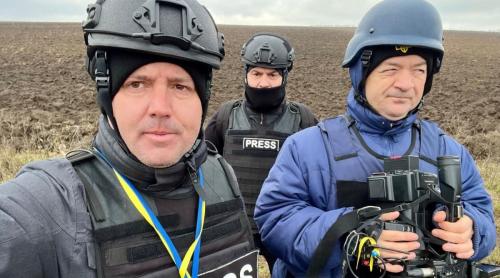
Reform is coming too slowly to institutions for adults with intellectual and mental health disabilities in Bulgaria, Romania and Serbia, where chronic neglect, filthy conditions, and the use of physical restraints and high-dosage drugs to control behaviour remain routine.
By Yana Buhrer Tavanier in Sofia, Goren Chiflik, Svilengrad, Radovets, Oborishte, Belgrade, Kulina, Churug, Bucharest, Mocrea and Gura Vaii
Someone is screaming her head off in what seems a desolate part of the yard. There is a fence surrounding some shacks and, with each step taken towards it, the shrieks get louder. Ten more steps and there's a gate in the fence. Another ten and all hell is let loose.
There is the screaming woman - barefoot, skinny and dressed in rags. There is another woman, unable to walk, rolling around on the ground, covered in flies - hundreds of them. In her filthy hands she clutches two chunks of bread. There is a girl dipping her dry bread in the dirty puddle in front of the outside toilets. Then she eats it. No-one pays attention.
It is lunchtime in Goren Chiflik, an institution in eastern Bulgaria, housing 90 women with intellectual and mental health disabilities. It was renovated recently, but the place of horrors, the shacks for the 'most disabled' residents, was left untouched. It is well hidden; so well hidden, in fact, that the head of the regional directorate for social protection says she has never seen it, despite having paid numerous visits to the institution. The 30 women here are not allowed to eat with the others. Instead, they are given their food behind the fence that is usually locked, effectively turning it into a cage.
This investigation, mostly conducted undercover in institutions for adults with intellectual and mental health disabilities in Bulgaria, Romania and Serbia, uncovered evidence of human rights abuses, inhuman and degrading treatment and appalling neglect. It showed that reform in this field remains patchy and slow, and too often leaves the most vulnerable behind.
Bulgaria and Romania, both EU members since 2007, and Serbia, which seeks the same status, have a grim track record when it comes to institutional care. This investigation suggests that they are still failing to meet international standards. Inadequate policies result in underfunding and a failure to recruit qualified, motivated staff. Residents are not being treated, so much as controlled. Many are gradually destroyed by constant exposure to harmful, high-dosage medication. People do not leave their beds for years. Children are being kept tied down for most of the time.
Much is at stake for these counties if they do not improve things. The European Commission has said it may suspend payments under the European Social Fund in case of serious irregularities in Bulgarian and Romanian institutions. As for Serbia, many important voices insist that the EU must demand a better human rights track record from future candidate countries. However, in practice, Brussels has been turning a blind eye to such abuses for years.
Tied up with drugs
In the institution for adults with mental illnesses in Radovets, I meet 76 unusually lethargic men. Too many hands are trembling, faces stiff and movements heavy. I am about to find out why.
Radovets is a tiny village in southeast Bulgaria and, like most institutions, it is as remote as can be. Attracting qualified personnel here is practically impossible.
Officially, I am in Radovets as a researcher for the Bulgarian Helsinki Committee, BHC, the country's most influential human rights NGO. This was the way I chose to gather most information for this investigation, as journalists make institutions nervous.
Although almost all the residents are diagnosed with schizophrenia, Radovets does not have a full-time psychiatrist. The director of the institution, Krayo Kraev, says just one such specialist works within a radius of 50km, and he only visits once a month.
One consequence of this neglect is that all the men in Radovets are on the same therapy, haloperidol, in every medical record we see. The director confirms this. "All residents have been prescribed haloperidol by the psychiatrist," he says. He sees nothing wrong with this state of affairs.
Medical experts maintain that haloperidol, an old antipsychotic drug, has extremely strong side effects, including tardive dyskinesia - involuntary movements of the face, hands and feet; akathisia - manifested in repeated rocking movements; lethargy and sleepiness.
The men in Radovets have taken haloperidol every day, sometimes for years. Records show that doses are high and the drug is given without consent. This means tranquil residents and untroubled staff. It also results in blurred minds and harmed bodies.
"This is not treatment, but taking control of people," Krasimir Kunev, head of the BHC, says. "I've never seen side effects so widespread."
During our visit, the men either sleep or sit in the yard doing nothing. Hristo is one. This 32-year-old, once an award-winning chess-player, describes his day: "I wake up, have breakfast, take my pills, but they suck all my energy out and I fall asleep. I wake up, go to lunch, thankfully we are not given pills then, so I play some chess; dinner comes, I take my pills, I am exhausted, I go to sleep."
As this applies for all the residents, it becomes clear why the old isolation unit - a tiny closet under the stairs - no longer has to be used. Drug-based restraint has become a substitute for physical restraint.
Challenged about the therapy, the director of Radovets says he will look into the issue.
"In these places, it's the staff that de facto administer medication. As the psychiatrist is not around to monitor, the staff tell him who 'needs' more sedation," Kunev says. "The staff in these institutions are, by default, unqualified and insufficient. Thus, it's a temptation to turn medical treatment into a method of controlling behaviour."
The Bulgarian government says the remote location of so many social care homes is a key factor behind the lack of qualified staff. It says it is committed to solving this problem.
The men in Radovets are not the only ones kept restrained with high-dosage tranquillisers. It is the same in Oborishte, a care home for adults, one-third of whose 98 residents have a mental illness.
A look at the medical records in Oborishte also reveals the widespread use of haloperidol. Many residents have been on 9mg per day for years. Professor Toma Tomov, a leading psychiatrist, says such strong doses should only be given for short periods and for acute conditions.
Professor Tomov asks the part-time psychiatrist at Oborishte why such high doses are routinely given to people who do not need them. "At night, we have only one guard and one nurse and it's scary," she says.
Her answer confirms that here too, people are over-medicated with potentially harmful drugs to guarantee peace for the insufficient staff. The director of the institution, Ilcho Goranov, defends the use of the drug on the grounds that "it is being administered by a professional". He has no plans to change dosages.
Those most in need get least
"We identified what we consider to be torture - children tied down to bed; a man who was in bed for eleven years," Eric Rosenthal, executive director of Mental Disability Rights International, MDRI, tells me. "The question is whether those abuses have been brought to an end." The answer is no.
In 2007, MDRI, which promotes human rights in this field, published a damning report on Serbia, highlighting habitual use of physical restraints and degrading treatment in Serbian care homes.
Serbia's authorities angrily rejected the accusations and still seem in a state of complete denial. Asked to comment on the current state of its care homes, Serbia's ministry for social affairs merely forwarded its reply to the 2007 MDRI report to me.
When I visit Kulina, an institution in southeast Serbia housing 500 adults and children with intellectual and developmental disabilities, there is some evidence of improvement. An attractive new building for 'supported living' has been erected. There is also a new sports field and day rooms, where less disabled children can draw and play. But, as in so many of these institutions in the region, parallel universes operate in Kulina.
In the two-storey pavilion for immobile residents, there is no elevator. Upstairs, I find people tightly packed in dark rooms. They are never taken out. Each room looks and feels like the next. It is dead quiet.
The 'severely disabled' children spend their time motionless in bed - sometimes physically restrained - or tied to chairs in empty day rooms. Some rock back and forth on the floor for lack of attention. I see many such forgotten children. Bed-ridden teenagers look no older than four. Children in cribs are horribly thin, arms and legs atrophied from disuse.
In most institutions in Bulgaria, Serbia and Romania, one problem is that those who need help most get least. There is not only a lack of financial and human resources and good medical care. There is a lack of understanding. As a result, people in the gravest conditions tend to suffer most.
In all the institutions visited, reform is patchy. Most have some renovated buildings and some 'transitional facilities' for a handful of residents. But improvement in overall standards of care, the provision of therapies other than drugs, and programmes preparing people for a return to the world, all seem a long way away.
Churug, a Serbian institution housing 206 men and women with mental illnesses, is another example of reforms that leave the most vulnerable behind. Churug contains three pavilions, of which two have been renovated. The third, housing "severe cases", has not. It is an old army building with dirty, dusty, stinking rooms. The manager says the people here receive no therapy apart from drugs. Activities in the day rooms are reserved for the "more able" residents.
In the home for women with mental illnesses in Svilengrad, Bulgaria, it is the same story. A cosy new transitional facility coexists with a pavilion for the immobile. There, it is the stench that hits you - the sickening smell of floors and mattresses drenched with urine and faeces. Women are packed in bare rooms. One woman is quietly crying. She is lying in her own excrement.
Goren Chiflik, the Bulgarian institution introduced at the beginning of this article, offers perhaps the most shocking case of parallel universes. The small new transitional facility, the main building, an empty new pavilion and the horrifying stables, where 30 women are locked up, are all in the same yard.
Director Stanislav Enchev is not planning to move the women from the old stables to the new pavilion because he fears that "they'll break everything". He says the authorities should grant funds to build one more pavilion.
But Borislav Natov, the local mayor, says such funds will not come from the municipality. "We have no budget to ensure normal living conditions for these people," he says. Maria Chankova, head of the regional social support directorate, promises "urgent measures". She has paid numerous visits to Goren Chiflik, but says she has never seen the women in the old stables.
I find Liliana in the old stables, covered in flies. Here since 1999, she is paralysed, crouched like a grasshopper, the skin on her legs yellowish-blue. At 62, she looks malnourished, her body strikingly thin. "Do they ever leave their beds? Do you take them outside?" I ask. The sanitary worker gives me a sad smile: "Usually I am alone here with 30 women. There's no time."
Another place where care is provided for some and not others is Mocrea psychiatric hospital in western Romania. 70 out of its 160 patients are chronically ill. The institution has recently been renovated. However, about half of the patients are effectively prisoners, locked in their rooms, only allowed out under supervision for 30 minutes at lunch and 40 minutes for a walk. The resident psychiatrist explains that some "might run away," and that others are "very aggressive".
In another Romanian institution, Gura Vaii, there is not even consistent access to running water. The 56 patients shower once a week. Despite numerous promises, the Romanian health ministry never answered a series of questions about the conditions in Mocrea and Gura Vaii. At Gura Vaii, the lack of care is complete. The two day rooms are locked and unused. "Is anything else going on here apart from medication?" I ask.
"Well, the music outside," the manager answers, referring to the loud sound of the radio blaring in the yard. Equally shocking is the manager's statement that most of the patients in the chronic psychiatric ward are not mentally ill but intellectually disabled, suffering from dementia or simply homeless. In the yard, they rock back and forth or stare into space. By the time I leave, even the music outside has stopped.
Getting away with murder?
"The European Commission is fully aware of the current problems in Bulgarian and Romanian institutions," the European Commission said in response to my questions. "There is always a possibility of payments being suspended under the European Social Fund in certain cases," it added.
Although many experts think the EU should require better track records on human rights from candidate countries, the Commission has refused to comment on this assertion.
"Bulgaria and Romania were quite literally getting away with murder," Oliver Lewis, of international rights organisation Mental Disability Advocacy Center, says. "People were, and are still, often subject to the most grotesque neglect and abuse."
Laura Parker, who worked as social policy advisor for the European Commission in Sofia before Bulgaria joined the EU, says: "It is clear the decisions about enlarging the EU were primarily political şandţ human rights are simply not an EU priority."
She and her colleagues "tried to reflect the reality...but, by the time various European Commission officials had edited them, the final Regular Reports did not accurately represent the situation."
Far from the eyes of Brussels and the minds of national governments, institutions housing the most vulnerable citizens in Bulgaria, Romania and Serbia remain no better than dumping grounds for forgotten people.
The graveyard of Radovets is a metaphor for this state of neglect. For about half a century, the institution has had its own plot and dozens of former residents lie beneath this overgrown field. However, there are only a couple of tombstones. Anonymity in death is a logical end to a life spent without rights or identity.
Deinstitutionalisation
Experts have been urging "deinstitutionalisation" for years. This involves the development of a network of community-based services, such as day-care centres and sheltered housing to prevent people from entering institutions or help them when leaving. However, according to the Open Society Mental Health Initiative, "none of the new EU member states have concrete plans or financing mechanisms to develop networks of community-based alternatives."
For example, according to the Bulgarian social ministry, in 2009, ten people were taken out of institutions and placed in protected houses. However, 1,300 are on a waiting list for admission to institutions. The Bulgarian Helsinki Committee calls this policy an "imitation of deinstitutionalisation".
People in institutions
3,700 in Bulgaria's institutions for adults with intellectual and mental health disabilities.
5,700 in institutions under Serbia's social ministry.
4,800 in the chronic wards of Romania's mental hospitals.
This article was produced as part of the Balkan Fellowship for Journalistic Excellence, an initiative of the Robert Bosch Stiftung and ERSTE Foundation, in cooperation with the Balkan Investigative Reporting Network, BIRN.


















